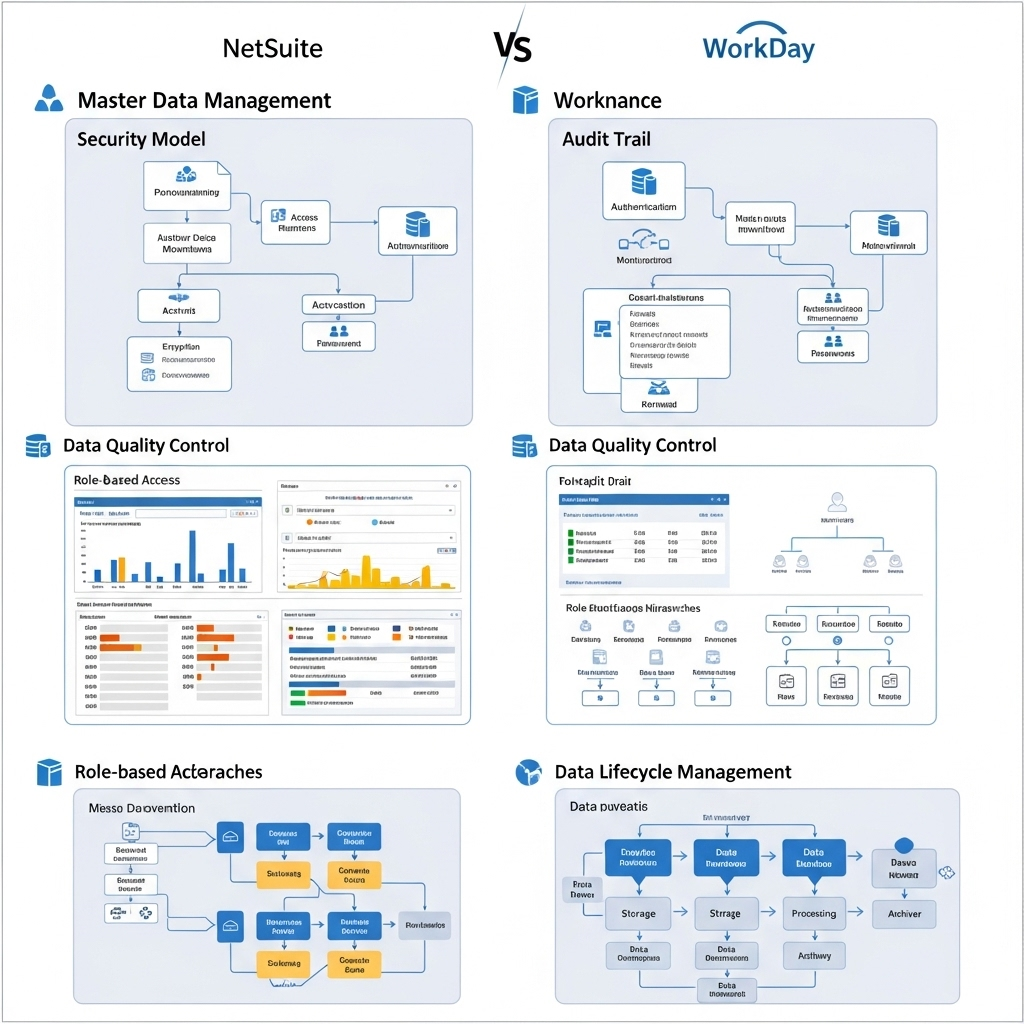
Table of Contents
Data Governance in Core Financial Systems
Financial management platforms like NetSuite and Workday Financials are pivotal, aren’t they? They act as the system of record for critical financial data that drives decisions and compliance. The quality, consistency, and security of this data directly shape business outcomes. So, how do these platforms enable organizations to maintain data integrity?
Insights distilled from numerous complex system deployments indicate that NetSuite and Workday Financials, despite similar high-level goals, take fundamentally different routes to data governance. These differences reflect their distinct architectures. While functional capabilities often take center stage during selection, the underlying data governance models profoundly impact long-term success.
Master Data Management Approaches
Managing core financial entities is a fundamental governance challenge. NetSuite offers a flexible, yet complex, approach. Think custom record types, SuiteScript automation for validation, and custom forms. This flexibility allows for highly tailored data models but, let’s be frank, it demands disciplined implementation to sidestep governance pitfalls.
Workday, on the other hand, presents a more structured, object-oriented approach. It uses a business object framework, configurable yet standardized attribute models, and strong enforcement of referential integrity. This path trades some flexibility for more robust built-in governance and consistency.
Data Quality Frameworks
Ensuring data accuracy requires specific quality controls. For Validation Rule Implementation, NetSuite relies heavily on SuiteScript for field-level and custom validations. Workday uses its business process framework and configurable business rules. When it comes to Duplicate Prevention, NetSuite offers standard detection for some records and custom options via saved searches. Workday features built-in fuzzy matching for core objects and configurable matching rules. For Data Completeness Monitoring, NetSuite users often leverage saved searches and dashboard indicators, while Workday provides comprehensive auditing and task-based notifications.
Security and Access Governance
Controlling who sees and modifies financial data is critical. NetSuite employs a role-based access model with extensive customization possibilities, including detailed permission-level controls and record-level permissions. This offers fine-grained control but can become complex to manage in large setups. Workday opts for a business process-centric security model, aligning security with organizational structure through domain and business process security policies. Which is better? It depends on the organizational context.
Audit Trail and Change Tracking
Documenting data modifications is essential. Both systems offer robust Change Logging Capabilities. NetSuite uses system notes and configurable custom field audit trails. Workday provides object-level audit history and comprehensive field change tracking. For Data Lineage Tracking, NetSuite offers source transaction references, while Workday has built-in object relationship tracking and process-based lineage.
When it comes to accessing Historical Records, NetSuite provides transaction version tracking. Workday’s effective-dated data model allows for point-in-time reporting and a complete visualization of change sequences. These capabilities are vital for compliance and troubleshooting, wouldn’t you agree?
Data Lifecycle and Integration Governance
Governing data from creation to archival is a complex task. NetSuite manages this with record status progression and custom inactivation processes, often automated via SuiteScript. Workday utilizes business object state management and effective-dating for lifecycle tracking, along with a native data retention policy framework.
Integration Governance is another key area. NetSuite uses SuiteTalk API governance and RESTlet security. Workday relies on integration system accounts and event-based triggers. Both provide frameworks for transformation rule management, with NetSuite offering ETL mapping in SuiteTalk and CSV import tools, and Workday providing its Enterprise Interface Builder and field-level transformation libraries.
Key Implementation Tradeoffs
A perspective forged through years of navigating real-world enterprise integrations suggests some clear tradeoffs. NetSuite provides greater customization flexibility but demands more governance discipline. Workday, in contrast, enforces stronger standardization with less deviation from its designed patterns. This often means NetSuite requires more technical resources for governance implementation, while Workday’s features can be more accessible to functional administrators. For scalability, NetSuite’s governance can become complex, whereas Workday’s approach tends to maintain consistent overhead as organizations grow.
Organizations should evaluate these platforms not only for their functional capabilities but for alignment with their data governance maturity and objectives. The ideal platform depends heavily on organizational governance requirements, technical resources, and tolerance for governance overhead versus flexibility.